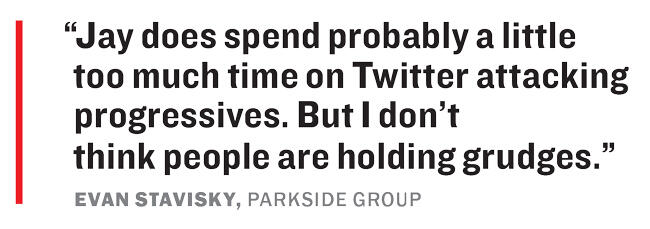There’s Jay Martin the Twitter personality, and then there’s Jay Martin the lobbyist. The former is a bit of a heel.
Over a few days in August, weeks before New York’s second primary, @jaymart222 was going scorched earth on the far left.
After Politico published a story detailing how state Sen. Alessandra Biaggi could be a temperamental boss, Martin dubbed her a “hypocritical narcissist.” He called out Democratic socialist Kristen Gonzalez for working for “a debt pimp like American Express” and dismissed a prominent tenant activist as having “no idea how housing, the economy or perhaps anything works.”
But on a phone call with The Real Deal the week before, Martin the lobbyist was all about finding common ground.
In nearly four years as executive director of the Community Housing Improvement Program, Martin said his main objective has been to steer the landlord group away from the bare-knuckle brawling typically seen in housing policy debates, and instead get property owners on board with a novel strategy: compromise.
“That means sometimes taking positions that are different than what the industry has taken before,“ Martin said. “That means trying to meet lawmakers more in the middle and not fighting every battle and saying no to everything.”
That’s a tough sell. For years, real estate could push pro-landlord policies in the Republican-dominated state Senate, and landlords haven’t yet adjusted to the new era. Many other industry advocacy groups haven’t, either.
When a ban on background checks for prospective tenants was floated in August, the Rent Stabilization Association, which had killed an earlier version of the bill in December, didn’t mince words.
“Blame your City Council representative, not your landlord, when a person with a criminal history of drug dealing, weapons possession, arson, domestic abuse or other violent crimes moves in next door,” RSA President Joseph Strasburg said at the time.
Martin, in contrast, wanted to pick CHIP’s battles. He called around to background-check companies and found that since the 2019 rent law capped application fees at $20, “virtually no one’s doing background checks, anyway.”
“We said, ‘Guys, would this really change how you operate your buildings? Are you actually even discriminating against those people?’” he recalled.
CHIP ended up offering to work with lawmakers on the legislation, but it’s unclear if they’ll take him up on it. And the bigger what-if, heading into the next legislative session, is whether CHIP can convince them that a push for rent reform will be a win-win-win for landlords, tenants and policymakers.
Martin pegged the proposed rollback of the state’s tenant-friendly 2019 rent law as CHIP’s top issue, one that keeps him up at night. He hopes to get the state to allow owners to set stabilized rents to market-rate once a tenant vacates so landlords can afford to bring neglected apartments back online.
What is clear, though, is his set of obstacles: a socialist wing in Albany, public disgust for landlords and the need to unite a disparate group of owners under one message.
Martin is armed with little revenue and a modest member base. Which is where his triple-threat — knowledge of Albany arcana, an Energizer Bunny work ethic and rhetorical savvy — comes into play.
Prince of Darkness strikes
From 2007 to 2018, Martin worked with the Independent Democratic Conference, a coalition that aligned with Republicans to form a majority in the state Senate.
As an executive aide to conference leader Sen. Jeff Klein and later chief of staff to conference whip Sen. David Carlucci, he saw how across-the-aisle alliances could get results.

“Remember: we did marriage equality, raised the minimum wage, passed the SAFE Act,” Carlucci said in an interview, referring to gun regulations passed in 2013.
Now 40 and bearded, Martin started working with campaigns as a teenager, encouraged by politically active grandparents who’d raised him in Pennsylvania’s Lehigh Valley.
“I was just some kid,” he said. “And I realized in a short amount of time I can have an impact on elections and politics.”
But in April 2018, Gov. Andrew Cuomo moved to dissolve the IDC. The primaries in September wiped six of the eight former IDC members from the state Senate and secured Democratic control of both houses of the legislature.
Within two months, Martin jumped. Though the move to CHIP was certainly a nod to the changing dynamics in Albany, he described it as being driven by his personal values.
As a kid, he and his mom escaped his abusive father by leasing an apartment from a small-time landlord in Philadelphia.
But his mom struggled to make rent. And after a few months of grace, their landlord, a widow with a mortgage to pay, had to cut the cord, Martin recalled, crediting the experience with shaping how he thinks of housing policy.
“There was this idea that stayed with me, that government could be doing more to fix this situation,” Martin said. “Where we’re failing is focusing on the landlord side or the tenant side and not what’s happening in the middle.”
Sidelined at the Super Bowl
Martin joined the landlord lobby with his hands tied behind his back.
Under state law, public-sector employees are barred for two years from using information or contacts from the agency they left behind for private-sector work.
So as New York’s Democratic Socialists were pushing for some of the strongest renter protections in the country, Martin had to mostly watch from the sidelines. Unable to lobby, he relied on second-hand snippets from another CHIP staffer.
“My only voice was really to use my personal account and tweet out into the ether problems I was seeing,” Martin said. “It sucked, it just really sucked.”
The 2019 rent law passed, stripping the rent-stabilized landlords Martin represents of nearly all avenues to increase rents. Martin, like most of the industry, was blindsided by the bill.
“It was completely contrary to what we had been getting from the other lobbyists that were working directly [with lawmakers],” he said, suggesting that had he been free to lobby, he might have been able to “soften” some of the language.
The rent drama, though, turned out to be what put CHIP on the map.
Despite its 56-year run, the group had little presence before Martin took the helm.
“When he was telling me he was going to work for them, I’m like, I’ve never heard of them before,” said Carlucci. “And I’m in the Senate for 10 years; I would seek out organizations, you know?”
Of the city’s three major landlord groups, CHIP is the smallest.

The Real Estate Board of New York has 15,000 members and spent $2.6 million on lobbying from 2018 to 2021. The RSA boasts a 25,000-member base, a $7.3 million budget and a $1.9 million lobbying receipt for the same period.
Meanwhile, CHIP, working with a four-person staff out of an office in the Financial District, has 3,700 members. Its revenue clocked in at just over $2 million in 2020, and it’s spent $700,000 on lobbying since the rent law threat of 2018.
And though real estate money doesn’t carry the weight it once did in Albany — since the Democrats took the Senate, many senators have refused to accept industry donations — it can still make things happen.
Evan Stavisky, a Democratic strategist and co-founder and president of the Parkside Group, noted that even if real estate can’t give directly to party committees, trade groups can make “independent expenditures,” which “can help support more moderate voices within the Democratic Party.”
“Money in politics is like water in geology,” Stavisky added. “It always finds a way.”
Talk is cheap
To compensate for CHIP’s lack of financial muscle, Martin has played to the organization’s strengths: a more manageable base and his own media savvy.
His tweets, he insisted, have “gotten me meetings that I think I wouldn’t otherwise have gotten, because the lawmakers could simply say, ‘Well, you’re a landlord organization; I don’t have to pay attention to you.’”
Others acknowledge that Martin’s social media presence likely isn’t working against him.
“Jay does spend probably a little too much time on Twitter attacking progressives,” said Stavisky. “But I don’t think people are holding grudges in that regard.”
CHIP also joined TikTok this year.
Some of the videos have found a mass audience, such as one about a rent-controlled vacant unit, set to rapper Mase’s 2004 hit “Welcome Back,” that notched over 400,000 views.
Martin hopes that such efforts provide a counter-narrative to content that typically plays well on social media, such as calls for socialized housing, abolishing landlords and canceling rent.
“There is a delineation between saying, ‘I want to end all evictions,’ and, ‘In some cases, evictions should be ended and in some cases, evictions should be allowed to go through,’” Martin said. “There is nuance in policy.”
Meanwhile, he’s nudging his members to consider the tenant’s perspective.
“When Jay came into this position, he said, ‘We’re not looking at the board the right way,'” said Zachary Kerr, the owner of 10 buildings in Brooklyn and a 25-year CHIP member. “This isn’t about property rights; it’s about tenants, the relationship you have with tenants, and it’s about creating affordable housing that works for the city,” Kerr recalled him saying.
Under Martin, CHIP has encouraged members to see what renters need so the group might push for mutually beneficial policies that could gain traction with lawmakers.
Kerr offered the vacant units issue as an example. After the rent law changed, he realized his buildings had been carrying “this weird vacancy rate” of near 6 percent where before it hung below 1 percent.
But talking to tenants, he learned they were suffering, too. A stabilized renter might need a new stove, but Kerr said he couldn’t budget it without the ability to raise rents.
“My philosophy has always been, I can’t survive without the tenant,” Kerr said.
Martin said he brings that same ethos to Twitter, trying to rein in landlords who sometimes veer off into personal attacks on lawmakers and tenant advocates.
Cea Weaver is a frequent target. In January, the Housing Justice For All organizer called out a trend of landlords calling her fat as “…really unacceptable for a number of reasons and it doesn’t help the pro landlord cause either. Fuck off,” she posted.
That was met with more insults from landlords. Val Gojcaj, a landlord who faced default last summer awaiting rent relief, replied with a tweet calling Weaver “disingenuous” and “#crybaby.”
“I certainly don’t want to be criticizing someone’s weight,” Martin said. “I’ve struggled with weight my whole life.” Weaver did not respond to a request for comment.
His recent name-calling of Biaggi aside, Martin — who has been out since he was 18 and has condemned homophobia online — said he tries to elevate the discourse away from personal insults. But it’s not a stretch to see how his self-described “sharp elbows” on Twitter might set the tone.
“What I’m trying to do is guide the property owners on there,” Martin said. “If you’re going to make substantial arguments, make them about the policy or what you’re personally going through and why.”
What could really make things happen is a somewhat revolutionary offer from the landlord camp: Work with the left to move the needle on affordable housing.
Martin, who acknowledges he’s never been in the same room as Weaver, said he would be more than open to collaborating to get compromises passed. He noted that CHIP took that approach with negotiating expanded housing vouchers.
“You are trying to represent people who need housing and I represent people who have housing, so at some point, there have to be some things that we can work on to put those two things together,” Martin said.
“I would work with Cea, I would work with Julia Salazar, I would work with anyone to get that done,” he insisted.
What remains to be seen is whether they would work with him.
